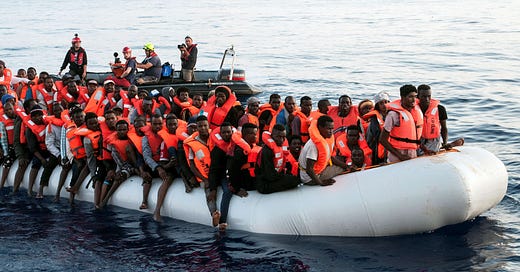Economic growth - the new justification for race replacement
Across Europe, nominally conservative governments are taking the position that mass immigration from the third world is necessary for GDP growth
Over the last decade, Europeans have grown used to hearing “we must provide refuge to those fleeing war and persecution” as a reason to accept large numbers of third worlders into their countries. A key moment occurred in 2015, when German chancellor Angela Merkel unilaterally and without consulting the German people, invited 1.2 million Syrians to settle in the country. The new arrivals were given generous benefits including apartments to live in, welfare payments to live off as well as access to national healthcare, schooling and more. As usual, the majority of the arrivals were young men aged 18-40.
As we subsequently learned, many of those who arrived turned out not to even be from Syria, but other assorted nations - Iraq, Afghanistan, Pakistan and various African countries. As is often the case across Europe, they arrive without any documents, making it difficult to prove where they came from. Where administered, DNA and dental tests have often proven their claims untrue, not least for numerous adult men claiming to be child refugees, many of whom have ended up in schools alongside native European children.
“We will manage this”, claimed Merkel in an attempt to assuage public fears. Exactly how this has been “managed” in the face of the subsequent terror attacks, sharp uptick in rapes and sex attacks (particularly in public baths) including the infamous mass rape in Cologne and increase in violent crime, is a question well worth asking.
The leadership of the European Union showed their true colours by immediately closing ranks around Merkel, declaring that not only did she do the right thing, but that “all European countries must take their fair share” - in other words, enforcing quotas for all EU nations to accept proportions of the new arrivals. Understandably this caused some discord, with two of the “Visegrad 4”nations, Poland and Hungary, refusing to sign up to this quota system. It seems quite possible in hindsight that the UK’s close vote to leave the European Union was influenced by these events.
It has been a common theme - predominantly with political leaders on the left, but increasingly on the right - that Western and European nations have some kind of moral duty to provide refuge to newcomers from far-flung corners of the world, with the assumption apparently baked in that they are always fleeing some sort of terrible circumstances such as war, persecution and famine.
Putting aside the question of why it is the duty of every white country to accept those fleeing the assorted problems of the world - particularly at the expense of their own citizens - lately there has been a noticeable change in rhetoric - and it’s a message we’ve heard before.
As thousands of young third world men arrive by boat daily on European shores, there seems to be little pretence any longer that they are fleeing any adversity at all. Indeed, the arrivals are now more commonly and accurately referred to as “migrants” than “asylum seekers” or “refugees”.
Our last article focused on how both the UK and Polish governments, both supposedly “conservative” administrations, seem to employ a tactic of making noise about preventing illegal immigration, while quietly issuing vast numbers of work visas to those from the third world.
PiS, the ruling Polish party, appeared to back down from its plan to issue 400,000 work visas to a list of countries including many in the Middle East and North Africa after pressure from leading right wing opposition party Konfederacja, and above all an opportunistic intervention from Donald Tusk, former Polish Prime Minster, President of the European Council and more significantly, current leader of PO, the main opposition party to PiS.
So did this spell the end of this PiS policy once and for all? Perhaps not. Barely weeks later, Polish Prime Minister Mateusz Morawiecki was quoted - after meeting with Italian Prime Minister Giorgia Meloni - who has pledged to issue 425,000 work permits to non-EU migrants before 2025 - as saying “Our countries have a very similar vision for the development of our continent and the matters at hand” - one of those matters being migration.
This is the same recently elected Giorgia Meloni who was decried as a “far right” politician by the left, while being celebrated by the right as a leader who would finally protect Italy’s borders. Now in power, Meloni seems to be following precisely the same playbook as the UK government - making loud noises about defending the nation from illegal immigration (while doing nothing about it) and simultaneously legally opening the doors to millions from the third world in the name of “economic growth”.
Former conservative party leader William Hague recently posted an article in the Times newspaper titled “Even right-wingers know we need migrants”. In this piece he argues that mass third world immigration to European countries is “inescapable” and we have no choice but to adapt to it. Speaking of the “coming age of migration”, he cites the number of no less than 140 million “on the move”. His arguments have a familiar theme - Europe is becoming “older and sicker”, therefore we simply need these people, so that we can achieve what he describes as the “economic and technological pre-eminence” of the United States.
That these are the words of a man who stood for election leading a party pledging reduced immigration seems remarkable - but perhaps we should not be surprised any more. Lately, it seems that conservative leaders across Europe and the Western world have begun singing from the same hymn sheet.
One thing seems certain - the likes of William Hague are so disconnected from the realities and views of the public, they have no idea just how sinister this all sounds to normal people. To the vast majority of us, the thought of 140 million mostly male third worlders descending upon all ethnic white nations - of whom the native populations are already a shrinking global minority - is terrifying. Not so to the likes of Hague and European ‘conservative’ leaders like Meloni and apparently Morawiecki too.
Given the near simultaneous timing of these announcements, and the striking similarity between the proposed numbers (400,000 per year as per the PiS plan vs 425,000 announced by Meloni) one can’t help wondering if these policies are being dictated from somewhere unseen and higher up. It would seem in the public benefit to know exactly who these leaders have been associating with behind the scenes. Which business leaders, think tanks and supranational organisations have they been talking to? One might even ask, have any large financial transactions taken place? It does seem we live in an age whereby political leaders on both sides are more beholden to big business and unelected supranational bodies, than the public whom they are mandated to serve. Increasingly they speak about our countries as if they were little more than giant corporations and their citizens easily interchangeable economic units.
ZUS, the Polish government agency responsible for state social insurance, announced that Poland needs 2 million immigrant workers to fund the system and maintain pensions for Poland’s growing number of retirees. While Poland’s dwindling pension pot is a pressing issue - given the incredible adversity Poland has faced as a nation, including being wiped off the map numerous times, not to mention invasions and devastation at the hands of the Germans and Russians in the 20th century - saving pensions seems an astonishing justification for erasing Poland yet again - but there it is.
The key question must be - what remains of a nation and its culture without its people? If we follow the logic of these leaders and policies, the price of this “economic growth” we endlessly hear of appears to be to be the ultimate replacement and erasure of our people. The arrival of nearly half a million individuals aged 18-40 each year would ensure that in most European countries, within just a few years the native populations within the child-bearing, working cohort will be outnumbered by the new arrivals.
The claim that third world immigration benefits European countries economically, generally speaking, does not hold up. As a study in Denmark found, immigrants from MENAPT countries (Middle East, North Africa, Pakistan, Turkey) are in fact an immense drain on the state;
“Immigrants and descendants from MENAPT countries cost the Danish state 85,000 kroner per person in 2018, according to the ministry. For those from other non-Western countries, the figure is 4,000 kroner per person”.
The study found that non-Western immigration costs Denmark a staggering 4.8 billion dollars per year - a finding that has led to calls for a much tougher immigration and deportation policy.
The globalist, pro-multiculturalism mantra ‘diversity is strength’, repeated endlessly to us, is built on a foundation of lies. Study after study has in fact shown that ethnic diversity leads to decreases in productivity, co-operation and the rule of law. The economic argument itself falls flat in the face of reality.
“We are in the beginning of mass extinction, and all you can talk about is money and fairy tales of eternal economic growth”, said Greta Thunberg, famously berating world leaders at the 2019 United Nations Climate Action summit. Greta may have had something slightly different in mind when she spoke of “mass extinction”, but her words couldn’t be more prescient today.






